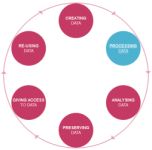
|
Digital Humanities Workbench |
Home page > Data collection > Data management Data management
It is advisable to write a data management plan before the start of a research project (if this is not already required by the organisation funding the project). This is a formal document that specifies how data will be handled both during your research project and after its completion. If you prepare a data management plan before the data are collected or digitised, this will usually benefit your project: by thinking through all aspects of the data cycle beforehand, you can increase research efficiently during your project and minimize the chance that you will have to reorganise the data during its course. By addressing the aspect of preservation at an early stage, you can take into account the archive's requirements regarding the format and documentation of the data. Finally, preparing a data management plan may also make it clear if you will need any technical support during your project, which enables timely planning with your ICT support unit.
Further information Research Data Essentials: Data life cycle (UB VU)
Research Data Essentials: Data life cycle (UB VU)This LibGuide Research Data Essentials from the University Library VU provides practical information and guidelines for both PhD students and researchers when working with research data, focusing on data management.
DMPonline
Preserving Your Digital Materials |
Other topics in this section: Introduction Digital archives Corpus compilation Survey Interview Experiment Field work |



